How ‘Habitat for Humanity’ changed one Aussie’s life
Habitat for Humanity is a non for profit originating that provides desperately needed infrastructure for people in poorer countries. This includes providing houses for struggling families, so they can have a safer environment to raise their children. Habitat for Humanity is available all around the world, but requires volunteers to travel over to different countries, to help build homes and other required infrastructure. Jo Parkinson who works in the public service here in Canberra, has been part of Habitat for Humanity on a two seperate occasions.
Jo who traveled to Vietnam in 2018 as part of an Australian ‘Habitat for Humanity’ group, has called the experience life changing. This was her second time volunteering for Habitat for Humanity as she traveled to Indonesia for the same cause in 2016. I had a chat with Jo to see how this experience has impacted her day to day life.
Q. What does ‘Habitat for Humanity’ do?
Habitat for Humanity is an organisation that helps build homes and infrastructure for people in need within 3rd world countries. Their motto is to build a home through ‘hand-up’ rather than ‘hand-out’, this means they work directly with the families in need. They do this by building a home that is safe to live in or it might be building a block of toilets in some communities or access to a fresh water well.
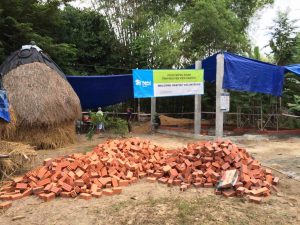
Q. Was it last year (2018) that you were apart of Habitat for humanity?
I have done 2 house builds, so Vietnam was 2018 and then one in 2016 which was in Indonesia.
Q. What were some of the things you did in Vietnam?
We did everything. We were building trenches, we were shoveling sand and sifting sand and soil to get good concrete, we did the brick laying and the rendering, we made the RIO – so building the framework of wire, which was all hand made.
So everything is hand worked, there is no machines. You are hand mixing concrete and wheelbarrow it around, shoveling stuff by hand. It’s really good, so you really do everything.
The only thing they were unable to do was to put the roof on the homes due to WHS reasons, we are not allowed to do that. For this task they get the locals to come in and finish off the roof, to complete all their hard work.
Since we were only there for a week, we were unable to fully finish off our home so we had locals come in to finish it off. We also had the locals helping us the whole time we were there, they were teaching us what to do and how to do it.
Once the house is finished, we get a picture sent to us to show exactly how the home looks when it is all finished.
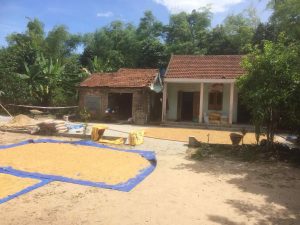
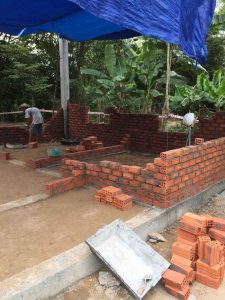
Q. What does it take to get involved in this project?
I cannot honestly recommend it enough. I am going to be doing it every second year, that’s my plan.
There is a fair bit of work in the fund-raising and because you are reaching out to your network, you don’t want to be doing that too often. Because there are so many charities out there and people are always giving to different things. You don’t want to feel like you’re doing that all the time.
There is also a financial cost to yourself with taking holidays or leave from work. Paying for your flights, all your accommodation, all your meals, visa, passport, travel insurance, all that is a cost that you have to bare yourself. Nothing is covered for you at all.
In terms of the fund-raising, I would ask people for a direct donation, I was lucky to have very generous people in my life. I would also cook and take things to work and sell them for morning teas, people love stuff like that. But this is all just part of the extra effort it takes to get the funds.
Q. Has this experience had an impact on your perspective of life in Australia?
Absolutely. Those two experiences were very different in themselves as well, there were different cultures and how the homes were put together, the way the families lived and that sort of stuff.
That of course impacts your life when you come back to Australia. You come home and see what you have in comparison to what you just built. I am so very grateful to be able to do that sort of thing, where I can take leave.
When you come home from 3rd world countries, it affected me as we are so lucky to live here and we do have so much that we take for granted, and we just don’t realise that. That’s why I like going to these countries as it makes me feel very grateful for that I have.
I definitely am not so much about acquiring stuff, I really want to make sure that the things I have are actually improving my life, I don’t just want more stuff around.
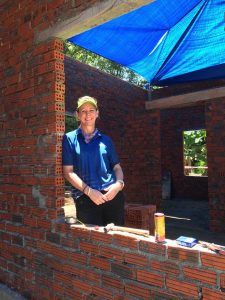
Q. How has being apart of ‘Habitat for Humanity’ impacted your day to day life?
People do not realise how lucky we are, all we do is want more and we are very disposable. You go to a 3rd world country and you see how they are recycling everything, there is a purpose for everything.
Even with the food they eat, here we waste a lot in comparison. I think we buy too much and we don’t appreciate each other, the sense of community over there is a lot better and I think that is pretty amazing.
Q. Would you call this a life changing experience?
Definitely. Yeah definitely life changing. (Again) for the reasons why I have already stated; learning a new culture, you meet amazing people and you build friendships that last after the build.
When you do something like this, you are not only helping the family who live in the house, but you are also helping the future generations of that family.

To sum up the experience Jo said “It is just so amazing that this is what you have done. It’s not just that you’re not helping that family that are poor, but you are helping the future generations. Kids now have their own room to study, that is away from their parents”.
The experience in Vietnam gave a new meaning to her life. She could clearly see what is important in life and can easily do away with all the ‘extra crap’ we prioritise in life. Jo praised how Habitat for Humanity is a remarkable organisation that improves the lives of families all around the world. As Jo has been a part of an Australian team in 2016 and 2018, it is clear that she loves being a part of it. Jo stated she wants to participate in it every second year and has her heart set on being a part of the 2020 team.
If you are wanting to learn more about this tremendous organisation, you can find there website here.



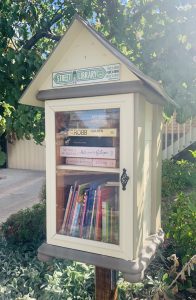
Be the first to comment!